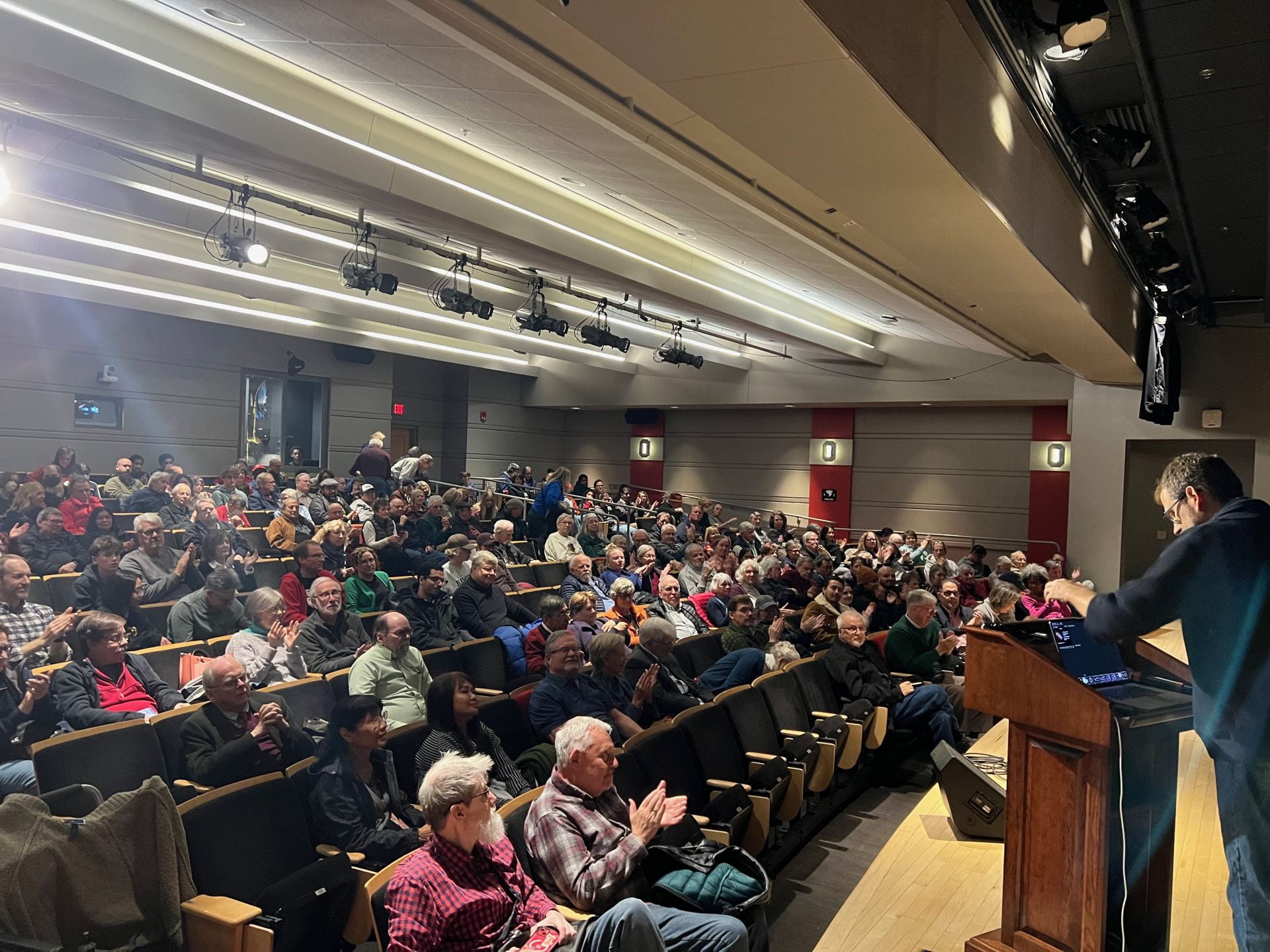
Professor Adam Leroy from Ohio State’s Department of Astronomy speaks to Science Sundays audience on Dec. 3, 2023. Credit: John Beacom
Quantum matter, genetically modified food and space, oh my!
Columbus community members can find all of this and more at Ohio State’s “Science Sundays,” a free lecture series held in the Ohio Union U.S. Bank Conference Theater.
Attendees have the opportunity to hear from expert speakers on current and emerging scientific topics that are relevant in a modern context, according to the Science Sundays webpage. John Beacom, an Ohio State professor and chair of the Science Sundays Organizing Committee, said these events exist to share research and information with the public and Ohio State students alike.
“The benefits of scientific discovery should belong to all of humanity, but not everyone has access to those things,” Beacom said. “With Science Sundays, we want to broaden that access so everyone in the Ohio community, not just students, has a chance to benefit from the engine of innovation that is happening at Ohio State.”
Created in 2011 by the College of Arts and Sciences, the program has since grown and featured many speakers covering topics ranging from quantum matter to the effects stress and anxiety have on individuals’ brains, according to the Science Sundays webpage.
All ages are welcome, but Beacom said he hopes to specifically connect with young children and high school students.
Most kids have met doctors or maybe a few engineers, but they have most likely not met scientists who work full-time on research, Beacom said.
“It’s hard for a kid to know if they want a career as a scientist if they’ve never really met one,” Beacom said. “We want to put some of that thrill of scientific discovery within their reach.”
According to Beacom, there have been about 250 people in attendance at recent talks. He said there is always a mix of current students and those of all ages with or without a scientific background.
Despite these diverse audiences, Beacom said making the events understandable to people of all educational backgrounds and ages is important.
“I tell speakers that they are not giving a seminar to their professional colleagues,” Beacom said. “Instead, they’re talking to someone they’re sitting next to on a plane or met at a party about what they do.”
Robyn Wilson, an Ohio State professor in the School of Environment and Natural Resources, spoke in January on climate change effects in Ohio. Her presentation revolved around its impact and the effort Central Ohio residents can take to better the natural future, according to the Science Sundays webpage.
“I feel like science is one way to help us identify better solutions to problems and to understand why we aren’t making progress on solving problems,” Wilson said. “I want people to be aware of what we’re doing, what we’re learning and what that means for problem-solving.”
Wilson said this concept of sharing ideas and informing the public is very important to her, as she believes it is a moral responsibility for scientists to share their findings with everyday people.
For those debating whether to attend a Science Sunday event or not, Wilson said she lives by the advice that “more education is never a bad thing.”
“You never know what you’re going to hear that you’ve never thought about before that broadens your horizons and makes you think differently about the world or piques your interest,” Wilson said. “It’s a very cool opportunity.”
Bart Elmore, an Ohio State history professor and previous Science Sundays speaker, said the events are a great occasion for Ohio State students to unwind and learn something new without the pressure of being graded.
“Going in that space and starting off your week with brilliance from these other speakers is amazing,” Elmore said.
After each lecture, an informal reception allowing individual audience members to meet with speakers takes place, Beacom said.
The reception that followed Wilson’s presentation was one of the more rewarding parts of her Science Sundays experience.
“It’s always great to make that connection with people, versus just standing up there, giving a talk, then disappearing and never knowing what impact it had,” Wilson said.
Wilson said she has had great interactions with a wide range of people at receptions, from speaking with a curious, elderly woman to a high schooler whose parents take him to every Science Sunday.
Elmore said that along with the personal interaction and engagement from the audience, the “mind-blowing” information he has learned from other speakers is what makes this event special.
“Science Sundays take these folks who do incredible work, but don’t wear it on their sleeve and gives them this opportunity to inform and riff a bit,” Elmore said. “And once that Q&A starts, it takes the experience to a new level from these specialists.”
The next Science Sundays event will be held April 21 at 3 p.m. and will feature Steffanie Strathdee, associate dean of global health sciences and professor of medicine at the University of California San Diego. More information on speakers, past events and RSVP access to upcoming events is available on the Science Sundays webpage.


